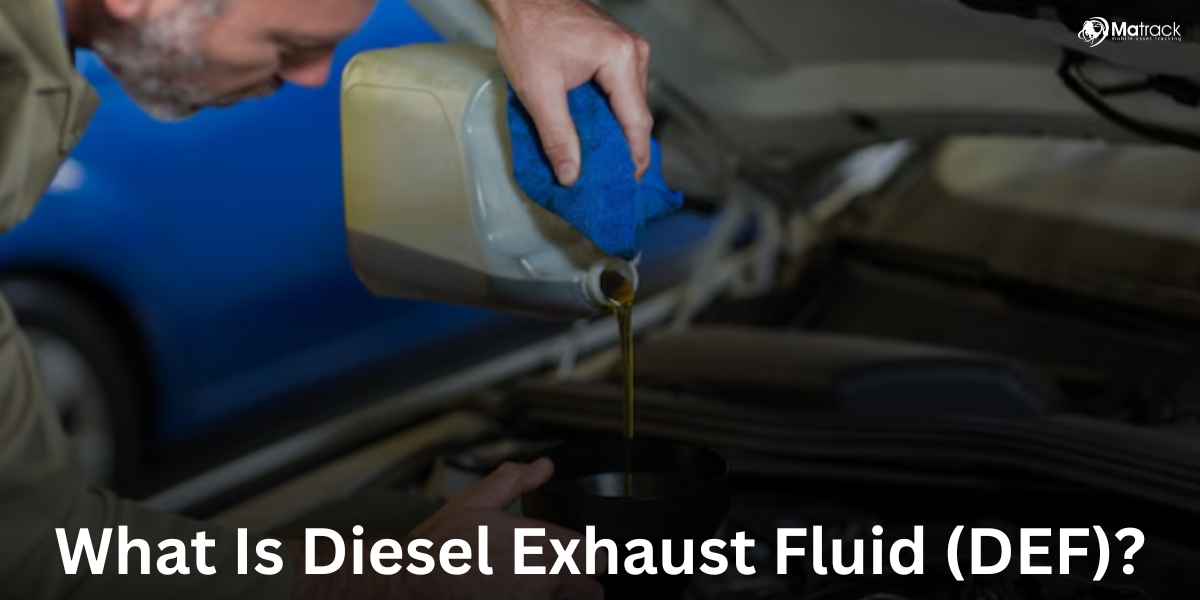Key Takeaways:
- Diesel Exhaust Fluid (DEF) lowers nitrogen oxide emissions, which helps diesel engines meet strict environmental rules and reduce air pollution.
- This reduction happens through Selective Catalytic Reduction, where DEF turns harmful gases into harmless nitrogen and water.
- To keep this system working properly, DEF must be stored in clean, sealed containers and handled with care to prevent contamination.
- When used correctly, DEF not only ensures legal compliance but also protects engine components and supports long-term efficiency.
What Is DEF?
Diesel Exhaust Fluid (DEF) is a clear, non-toxic solution designed to reduce harmful nitrogen oxide (NOx) emissions from diesel engines. It contains exactly 32.5% high-purity urea and 67.5% deionized water, ensuring the right chemical balance for emissions control.
DEF helps diesel engines meet strict environmental regulations set by agencies such as the EPA. By using DEF, operators lower emissions while keeping engine performance efficient and compliant.
Why Diesel Exhaust Fluid (DEF) Is Important?
Diesel Exhaust Fluid (DEF) is important because it directly reduces nitrogen oxide (NOx) emissions produced by diesel engines. NOx emissions contribute to air pollution, smog formation, and serious health problems, including respiratory diseases.
The use of DEF allows diesel vehicles to meet strict emissions regulations, including those set by the Environmental Protection Agency (EPA) and Euro 6 standards. Meeting these standards is essential for legal operation and environmental responsibility.
DEF also supports the efficiency of modern diesel engines by enabling cleaner combustion processes. Cleaner emissions extend the life of exhaust system components, reducing maintenance costs over time.
How Diesel Exhaust Fluid (DEF) Works?
Diesel Exhaust Fluid (DEF) works through a process called Selective Catalytic Reduction (SCR) in diesel vehicles. In this process, DEF is injected into the exhaust stream after combustion, where it reacts with nitrogen oxide (NOx) gases.
Inside the SCR catalyst, the urea in DEF breaks down into ammonia under high temperatures. This ammonia triggers a chemical reaction that converts NOx into harmless nitrogen gas and water vapor.
The SCR system ensures that DEF is dosed automatically based on engine load and emissions output. This precise dosing guarantees effective emissions control without affecting engine performance.
What Are the Components of Diesel Exhaust Fluid (DEF)?
Diesel Exhaust Fluid (DEF) contains two main components that work together to reduce harmful emissions:
- Urea (32.5%): This is a nitrogen-rich compound that turns into ammonia when heated in the exhaust system. The ammonia helps break down nitrogen oxide (NOx) into harmless nitrogen and water.
- Deionized water (67.5%): This highly purified water dissolves and carries the urea. It ensures the solution is evenly sprayed into the exhaust without introducing impurities that could harm the system.
Both ingredients are carefully measured and must meet ISO 22241 standards to guarantee performance and protect engine systems.
Where Diesel Exhaust Fluid (DEF) Is Used?
Heavy-duty trucks
DEF is common in freight trucks, long-haul rigs, and delivery vehicles. These trucks depend on DEF to comply with EPA and Euro 6 emissions regulations during daily operation.
Off-road equipment
Agricultural tractors, construction machinery, and mining equipment use DEF to reduce NOx emissions. These machines operate in regulated sectors that require clean exhaust systems.
Diesel passenger vehicles
Some cars, SUVs, and light trucks equipped with diesel engines use DEF. These vehicles combine DEF and SCR systems to provide low-emission performance without sacrificing power.
How To Store Diesel Exhaust Fluid (DEF)?
Diesel Exhaust Fluid (DEF) must always be stored in clean, sealed containers to prevent contamination. Exposure to dirt, fuel, or other substances reduces its effectiveness and can damage the Selective Catalytic Reduction (SCR) system.
It is important to keep DEF at temperatures between -11°C and 30°C to maintain its chemical stability. Storing it outside this range either causes it to freeze or lose its quality.
Containers of DEF should stay away from direct sunlight or UV light to protect the urea content. A shaded or indoor storage area helps preserve DEF’s purity and shelf life.
How To Handle Diesel Exhaust Fluid (DEF)?
To handle Diesel Exhaust Fluid (DEF) safely, always wear protective gloves during refilling. This prevents direct skin contact and reduces the chance of irritation or contamination.
Use only clean and dedicated equipment when transferring DEF into the tank. Dirty tools or shared funnels introduce impurities that can harm the Selective Catalytic Reduction (SCR) system.
Dispose of empty DEF containers in accordance with local environmental guidelines. Proper disposal keeps harmful residues out of soil and water sources.
How To Refill Diesel Exhaust Fluid (DEF)?
To refill Diesel Exhaust Fluid (DEF):
- Locate the DEF filler port, often marked with a blue cap near the fuel tank.
- Open a sealed DEF container to avoid contamination.
- Pour DEF slowly into the filler port until the tank reaches capacity.
- Close the cap securely to protect against contaminants.
What Are The Benefits and Common Issues Of Diesel Exhaust Fluid (DEF)?
| Benefits of DEF | Common Issues of DEF |
| Reduces NOx emissions by up to 90% | Contamination from dirt or other fluids |
| Helps diesel engines meet emissions standards | Freezing below -11°C (12°F) |
| Improves fuel efficiency by up to 5% | Incorrect urea concentration in poor-quality DEF |
| Extends life of SCR system components | Degradation from exposure to heat or sunlight |
| Supports cleaner air and environmental goals | Crystallization or clogging in the DEF system |
Frequently Asked Questions
What happens if Diesel Exhaust Fluid (DEF) runs out?
If Diesel Exhaust Fluid (DEF) runs out, the vehicle will automatically switch to reduced power mode. The engine stays in this limited performance state until the DEF tank is refilled to ensure emissions compliance.
What is the shelf life and stability of Diesel Exhaust Fluid (DEF)?
Diesel Exhaust Fluid (DEF) has a shelf life of up to 12 months when stored below 25°C. Exposure to temperatures above 30°C lowers urea concentration and reduces DEF effectiveness.
Where can I buy Diesel Exhaust Fluid (DEF)?
You can buy Diesel Exhaust Fluid (DEF) at fuel stations, auto parts stores like AutoZone and NAPA, and online platforms such as Amazon. Many fleet suppliers also offer DEF in bulk for commercial operations.
How does Diesel Exhaust Fluid (DEF) support environmental goals?
Diesel Exhaust Fluid (DEF) helps reduce air pollution by cutting nitrogen oxide (NOx) emissions in diesel engines. This contributes to cleaner air, less smog, and progress toward climate targets.
What are the common myths about Diesel Exhaust Fluid (DEF)?
A common myth is that DEF is a fuel additive, but DEF is not mixed with fuel — it is injected into the exhaust. Another myth claims DEF damages engines, though DEF never enters the engine. Some believe DEF is dangerous to handle, but it is non-toxic when handled correctly.
How can I prevent Diesel Exhaust Fluid (DEF) contamination?
Store DEF in clean, sealed containers designed for urea solutions. Always use dedicated equipment and tightly close containers after each use to block dirt or debris.
What are the costs of Diesel Exhaust Fluid (DEF)?
Diesel Exhaust Fluid (DEF) typically costs between $2 and $5 per gallon, depending on location and quantity. Fleets can lower the cost by buying in bulk, and DEF use averages 2% to 3% of diesel fuel consumption by volume.



